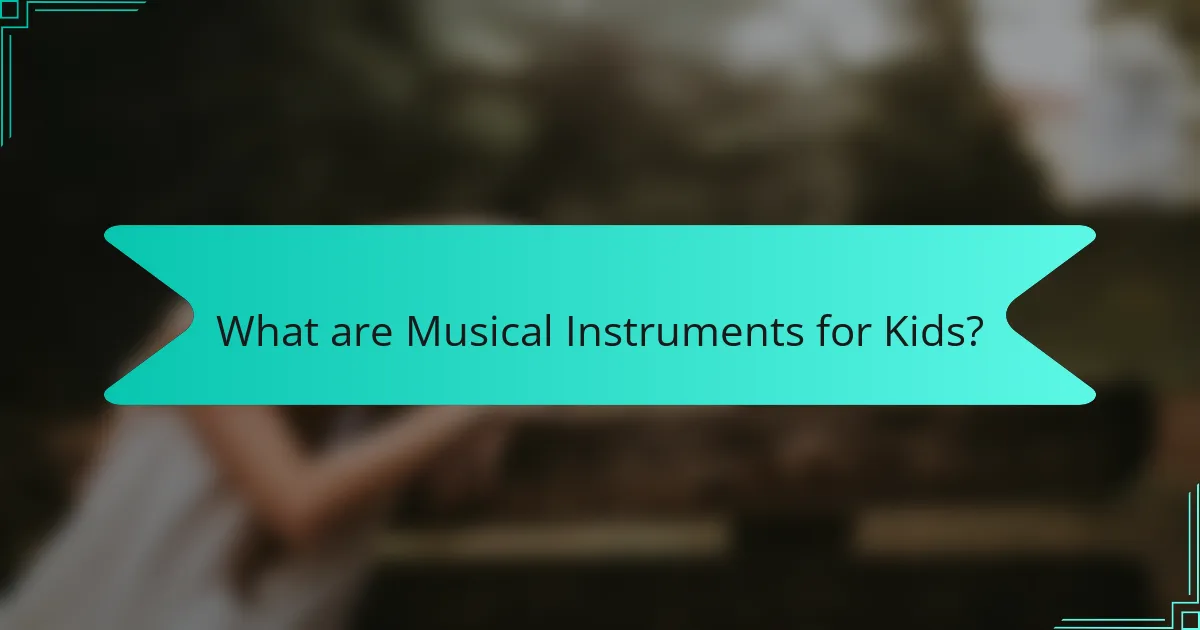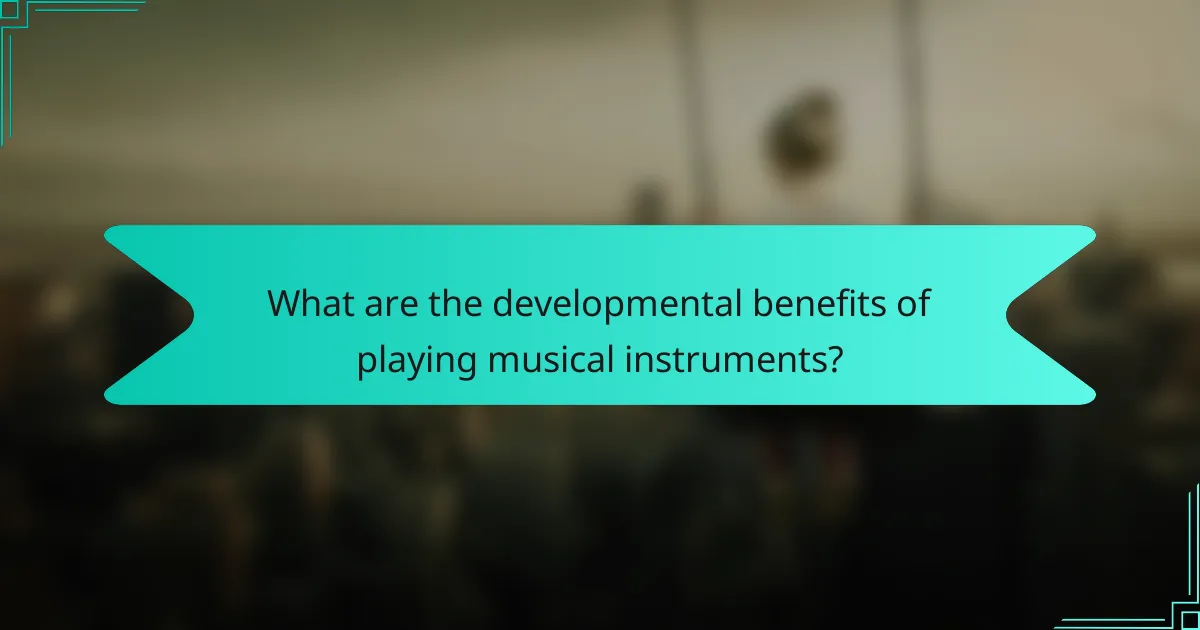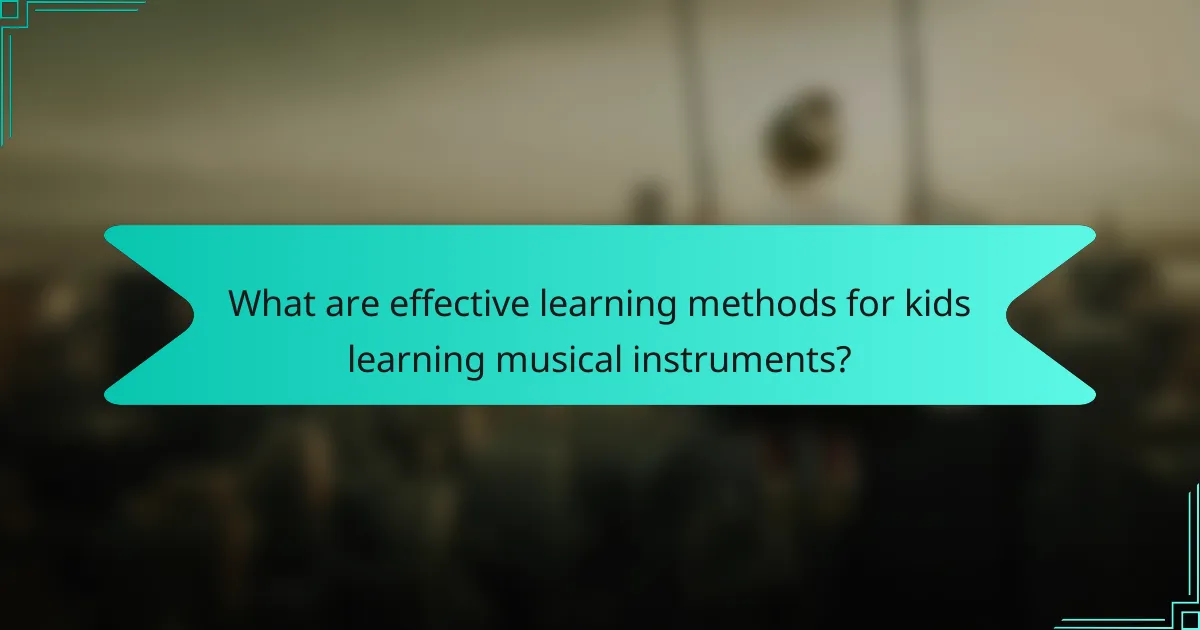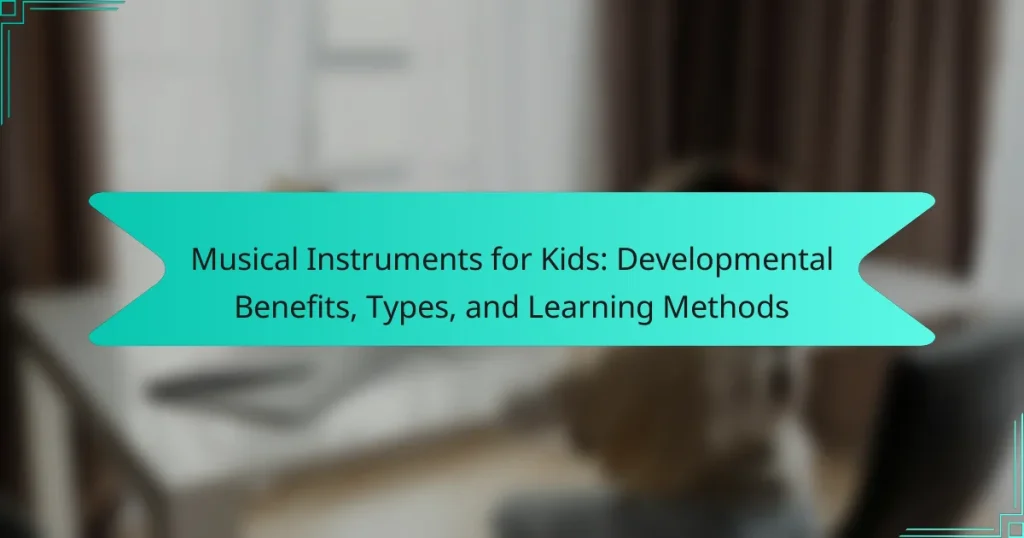Musical instruments for kids are specially designed tools that enable children to create music, including keyboards, drums, guitars, and flutes. These instruments are typically smaller and made from child-friendly materials, ensuring safety and ease of use. Engaging with musical instruments enhances cognitive skills such as memory and attention, while also fostering emotional development and social skills through collaborative play. Effective learning methods, including structured lessons and technology integration, are essential for helping children develop their musical abilities. Overall, music education contributes to improved academic performance and boosts creativity in young learners.

What are Musical Instruments for Kids?
Musical instruments for kids are tools designed to help children create music. These instruments include items like keyboards, drums, guitars, and flutes. They are often smaller in size and easier to handle for young users. Many instruments are made from child-friendly materials to ensure safety. Kids can learn rhythm, melody, and coordination through playing these instruments. Educational benefits include improved cognitive skills and enhanced creativity. Studies show that music education can boost academic performance in other subjects. Overall, musical instruments for kids facilitate both fun and learning experiences.
Why should kids learn to play musical instruments?
Kids should learn to play musical instruments because it enhances cognitive development. Learning an instrument improves memory and attention skills. Studies show that music training increases IQ scores. It also fosters creativity and self-expression. Playing instruments can boost social skills through group activities. Furthermore, it teaches discipline and patience through practice. Research indicates that musical training can lead to better academic performance. Overall, engaging with music provides a well-rounded developmental experience for children.
What developmental skills are enhanced by playing musical instruments?
Playing musical instruments enhances various developmental skills. These skills include cognitive abilities, motor skills, and social skills. Cognitive development is improved through reading music and understanding rhythms. Motor skills are enhanced as playing requires coordination and fine motor control. Social skills are fostered through group playing and collaboration. Research indicates that children who play instruments show improved academic performance, particularly in math and language. A study by Hanna-Pladdy and Mackay (2011) found that musicians had better cognitive flexibility than non-musicians. This evidence supports the claim that musical training positively influences developmental skills.
How does music education impact children’s cognitive development?
Music education enhances children’s cognitive development by improving skills such as memory, attention, and problem-solving. Studies show that children who engage in music education exhibit better verbal and mathematical abilities. For example, research published in the journal “Psychology of Music” indicates that music training can lead to increased IQ scores. Additionally, music education fosters creativity and critical thinking. It encourages children to express themselves and think outside the box. Furthermore, learning an instrument develops fine motor skills, which are crucial for overall cognitive growth. Engaging with music also helps in emotional regulation, which supports learning and focus in academic settings. Overall, music education provides a multifaceted boost to cognitive abilities in children.
What types of musical instruments are suitable for kids?
Percussion instruments, such as tambourines and drums, are suitable for kids. They are often easy to play and help develop rhythm. String instruments like ukuleles are also appropriate. Ukuleles are small and lightweight, making them manageable for young children. Keyboard instruments, including small pianos or keyboards, are beneficial as they introduce musical concepts. Wind instruments like recorders are simple and popular choices for beginners. These instruments encourage creativity and can enhance motor skills. Studies show that early musical exposure can improve cognitive development in children.
What are the most popular beginner instruments for children?
The most popular beginner instruments for children are the keyboard, guitar, and ukulele. Keyboards are versatile and allow children to explore various sounds. Guitars are accessible and encourage strumming and singing. Ukuleles are small, lightweight, and easy to hold. These instruments are user-friendly and suitable for young learners. They also promote musical engagement and creativity. Research indicates that early exposure to music can enhance cognitive skills and social development in children.
How do different instruments cater to various age groups?
Different instruments cater to various age groups by considering physical, cognitive, and emotional development. Younger children benefit from smaller, lighter instruments, such as ukuleles or xylophones, which are easier to handle. These instruments often have simple melodies that help develop basic musical skills. For preschoolers, instruments like tambourines and maracas enhance motor skills and rhythm understanding.
As children grow, they can manage more complex instruments, such as keyboards and guitars. These instruments support deeper cognitive engagement through learning chords and scales. Adolescents may gravitate towards band instruments like trumpets or saxophones, which promote teamwork in ensembles.
Each instrument’s design and playability are tailored to the developmental stage of the user. For instance, the piano’s visual layout aids in learning music theory, while percussion instruments improve coordination and timing. Research shows that engaging with age-appropriate instruments fosters a positive attitude towards music and enhances overall learning experiences.
How can parents choose the right musical instrument for their child?
Parents can choose the right musical instrument for their child by considering the child’s age, interests, and physical capabilities. Younger children may benefit from smaller instruments like the ukulele or recorder. Older children might prefer instruments like the guitar or piano. Assessing the child’s interest can help ensure engagement and motivation. Physical attributes, such as hand size and strength, should also be considered. For instance, a child with smaller hands may struggle with larger instruments like the trumpet. Additionally, trying out different instruments can help determine what resonates with the child. Many music stores offer rental programs or trial lessons to facilitate this process. Research indicates that early exposure to music can enhance cognitive development, making the choice of instrument significant for long-term benefits.
What factors should be considered when selecting an instrument?
When selecting a musical instrument for kids, several factors should be considered. The child’s age and physical size are crucial. Instruments should be age-appropriate to ensure they are manageable. The child’s interest in specific sounds or styles influences selection. Familiarity with the instrument can enhance motivation. Budget considerations are also important, as some instruments are more expensive than others. The instrument’s portability matters for ease of transport. Lastly, the availability of lessons or instructional materials can impact the learning experience. These factors collectively ensure a suitable match between the child and the instrument, promoting engagement and development.
How does a child’s interest influence instrument selection?
A child’s interest significantly influences instrument selection. When children are excited about a particular instrument, they are more likely to engage with it. This engagement fosters motivation and encourages consistent practice. For example, a child fascinated by drums may practice more often than one who is indifferent. Research indicates that children who choose instruments aligned with their interests show improved learning outcomes. A study by Hargreaves and North (2001) found that personal preference directly impacts musical development. Thus, aligning instrument selection with a child’s interests enhances their overall musical experience.

What are the developmental benefits of playing musical instruments?
Playing musical instruments offers significant developmental benefits. It enhances cognitive skills such as memory, attention, and problem-solving. Research shows that children who play instruments perform better academically. They often exhibit improved language skills and literacy. Playing music fosters emotional development through expression and creativity. It also promotes social skills through collaboration in group settings. Furthermore, learning an instrument improves fine motor skills and coordination. A study by the University of California found that musical training accelerates brain development in children.
How does playing an instrument improve social skills?
Playing an instrument improves social skills by fostering collaboration and communication. Engaging in group music activities requires individuals to listen and respond to each other. This interaction enhances verbal and non-verbal communication abilities. Additionally, playing in ensembles or bands builds teamwork skills. Participants learn to negotiate roles and share responsibilities. Research shows that children involved in music programs exhibit higher social competence. A study by the University of California found that music education correlates with improved empathy and social awareness. Overall, playing an instrument creates opportunities for social interaction and personal connection.
What role does group music-making play in social development?
Group music-making fosters social development by enhancing communication, cooperation, and empathy among participants. It encourages individuals to listen and respond to each other, building essential social skills. Collaborative music-making activities require teamwork, which strengthens relationships and promotes a sense of belonging. Research indicates that children involved in group music-making show improved social interactions and increased emotional intelligence. For example, a study published in the Journal of Research in Music Education found that children in ensemble settings exhibited greater prosocial behaviors. These experiences contribute to a supportive community, essential for healthy social development.
How can music education foster teamwork and collaboration?
Music education fosters teamwork and collaboration by requiring students to work together in ensembles. In these settings, individuals must listen to one another and synchronize their playing. This process develops communication skills and enhances group dynamics. Research shows that participating in group music activities improves social skills among children. For instance, a study by Hallam (2010) highlights that collaborative music-making leads to greater empathy and understanding among peers. Additionally, music education encourages shared goals, as students strive to achieve a cohesive sound. This collective effort builds a sense of community and belonging. Ultimately, music education provides a structured environment for developing essential teamwork skills.
What cognitive benefits are associated with learning an instrument?
Learning an instrument enhances cognitive abilities such as memory, attention, and problem-solving skills. Research indicates that musical training improves verbal memory, spatial reasoning, and literacy skills. A study published in the journal “Psychological Science” found that children who received music lessons showed greater improvements in IQ compared to those who did not. Additionally, learning an instrument fosters discipline and patience, as practice requires consistent effort. The act of reading music also enhances visual-spatial skills, which are crucial for various academic subjects. Overall, engaging with music stimulates brain development in multiple areas, leading to long-term cognitive benefits.
How does music training enhance memory and attention?
Music training enhances memory and attention through cognitive development and neural connections. Engaging with music requires the brain to process auditory information, improving auditory attention. Studies show that children involved in music training exhibit better memory recall than their non-musical peers. For instance, research published in the journal “Psychological Science” indicates that musical training enhances working memory capacity. Additionally, music training fosters discipline and focus, further enhancing attention spans. These skills transfer to academic tasks, leading to improved performance in school. Overall, the structured nature of music practice significantly benefits cognitive functions related to memory and attention.
What is the connection between music and language development?
Music and language development are interconnected through shared cognitive processes. Both music and language rely on auditory discrimination, rhythm, and pattern recognition. Research indicates that musical training enhances phonetic awareness, which is crucial for reading and language skills. A study by Moreno et al. (2009) found that children with music training showed improved verbal memory and vocabulary. Additionally, music exposure supports emotional expression, which aids in social communication. Overall, engaging with music can significantly bolster language acquisition and literacy in children.
How does learning an instrument affect emotional well-being?
Learning an instrument positively affects emotional well-being. It enhances self-esteem through skill development and achievement. Engaging with music provides an emotional outlet. This outlet can reduce stress and anxiety levels. Research indicates that music participation fosters social connections. These connections further support emotional resilience. A study by the American Psychological Association found that music-making can lead to increased happiness. Overall, learning an instrument contributes to a healthier emotional state.
What impact does music have on self-esteem in children?
Music positively impacts self-esteem in children. Engaging with music fosters a sense of achievement. Children who learn to play instruments often experience increased confidence. Participation in music activities promotes social interaction. This interaction can enhance a child’s sense of belonging. Studies show that music education correlates with improved self-image. For instance, a study published in the Journal of Research in Music Education found that music students reported higher self-esteem levels. Music also provides an emotional outlet, helping children express feelings constructively. Overall, music contributes significantly to the development of healthy self-esteem in children.
How can playing music serve as an emotional outlet for kids?
Playing music serves as an emotional outlet for kids by allowing them to express feelings that may be difficult to articulate. Engaging with music can help children process emotions such as joy, sadness, or frustration. Through playing instruments or singing, kids can channel their feelings into creativity. Research indicates that music can reduce anxiety and improve mood in children. A study by the American Psychological Association found that musical engagement can enhance emotional intelligence. This emotional intelligence helps children navigate social situations and build relationships. Furthermore, music provides a sense of accomplishment, boosting self-esteem. Overall, playing music enriches emotional development in children.

What are effective learning methods for kids learning musical instruments?
Effective learning methods for kids learning musical instruments include structured lessons, interactive practice, and technology integration. Structured lessons provide a clear framework and goals for children. This method often involves regular sessions with a qualified instructor. Interactive practice engages kids through games and activities. This approach helps maintain interest and motivation. Technology integration utilizes apps and online resources for learning. Research shows that children using these methods improve their skills faster. A study by Hargreaves and North (1999) indicates that varied teaching methods enhance musical learning outcomes in children.
What teaching styles are most effective for young learners?
Active learning and hands-on experiences are the most effective teaching styles for young learners. These approaches engage children and promote deeper understanding. Research shows that interactive methods enhance retention and motivation. For example, studies indicate that children learn better when they can participate actively in lessons. Visual aids and music integration also support learning by appealing to various senses. According to the National Association for the Education of Young Children, developmentally appropriate practices foster engagement and curiosity. Thus, employing active and interactive teaching styles is crucial for effective learning in young children.
How does a structured lesson plan benefit music education?
A structured lesson plan benefits music education by providing a clear framework for instruction. It helps educators define objectives and outcomes for each lesson. This clarity improves student engagement and focus during lessons. Additionally, structured plans allow for consistent assessment of student progress. Research indicates that structured learning environments enhance retention and understanding of musical concepts. A study by the National Association for Music Education found that students in structured programs show greater improvement in skills. Therefore, structured lesson plans are essential for effective music education.
What role do games and activities play in music learning?
Games and activities enhance music learning by making it engaging and interactive. They promote active participation, which is essential for retention. For example, rhythm games help develop timing and coordination. Singing games improve pitch recognition and vocal skills. Research shows that playful learning environments boost cognitive development. Activities like group music-making foster social skills and teamwork. These experiences create a positive association with music, encouraging continued practice. Overall, games and activities facilitate a deeper understanding of musical concepts.
How can technology assist in learning musical instruments?
Technology assists in learning musical instruments by providing interactive tools and resources. Apps can offer lessons, tutorials, and practice exercises tailored to individual skill levels. Online platforms enable access to a wide range of instructional videos and courses. Digital tuners and metronomes help students improve their timing and pitch accuracy. Virtual reality can create immersive learning experiences for users. Software can also analyze performance and provide feedback for improvement. Many musicians use technology to collaborate remotely, enhancing learning through shared experiences. Studies show that technology can increase engagement and motivation in music education.
What apps and tools are available for kids learning music?
Apps and tools available for kids learning music include Yousician, Simply Piano, and GarageBand. Yousician offers interactive lessons for various instruments. Simply Piano provides instant feedback for piano learners. GarageBand allows kids to create music digitally. Other notable options are Music Tutor, which helps with note reading, and SmartMusic, which offers practice tools for various instruments. These apps engage children through gamified learning experiences. They cater to different age groups and skill levels, making music education accessible and fun.
How can online lessons complement traditional music education?
Online lessons can enhance traditional music education by providing flexible access to diverse resources. Students can learn at their own pace, accommodating individual schedules. This flexibility allows for additional practice and exploration outside of structured classes. Online platforms offer a variety of instructional styles and materials. Students can access video tutorials, sheet music, and interactive exercises. Research indicates that online learning can improve engagement and retention in music education. A study by the National Endowment for the Arts found that students using online resources showed increased motivation and skill development. Thus, online lessons serve as a valuable supplement to traditional methods.
What tips can help kids stay motivated while learning an instrument?
Setting achievable goals helps kids stay motivated while learning an instrument. Goals provide a clear target for progress. Regularly practicing short, focused sessions keeps kids engaged. This approach prevents frustration and promotes a sense of accomplishment. Incorporating fun activities, like playing along with favorite songs, makes practice enjoyable. Positive reinforcement from parents or teachers boosts confidence and motivation. Participating in group lessons or performances fosters a sense of community. This connection encourages kids to practice and improve. Celebrating milestones, no matter how small, reinforces their efforts and keeps motivation high.
How can parents support their child’s musical journey?
Parents can support their child’s musical journey by providing access to instruments and lessons. They should encourage regular practice and celebrate progress. Creating a positive environment for music appreciation is essential. Attending performances together can enhance interest. Parents can also engage in music-related activities, such as singing or playing together. Research shows that parental involvement boosts children’s musical skills and motivation. A study by Hargreaves and North highlights the importance of family support in musical development.
What are some fun practice strategies for kids?
Incorporating games into practice sessions makes learning fun for kids. Activities like music-themed scavenger hunts can engage children. Using apps that turn practice into a game can motivate kids to play regularly. Group lessons or playdates with friends can create a social atmosphere. Short, focused practice sessions keep attention high. Rewarding progress with small incentives encourages continued effort. Interactive tools like rhythm games enhance skill development. Finally, allowing kids to choose songs they enjoy fosters a personal connection to music.
Musical instruments for kids are specially designed tools that facilitate music creation, including keyboards, drums, guitars, and flutes. These instruments support cognitive development, enhance creativity, and improve social skills through collaborative music-making. The article explores the various types of instruments suitable for different age groups, effective learning methods, and the significant developmental benefits associated with playing music, such as improved memory, attention, and emotional well-being. Additionally, it provides insights into how parents can support their child’s musical journey and maintain motivation during learning.




